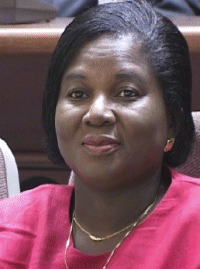
In a recent op-ed, Veteran Ghanaian journalist and former minister Elizabeth Ohene (pictured) writes about Ghanaians’ seemingly obsessive dependency on miracle cures rather than practing “austerity,” for example, and/or implementing proper dietary and physical exercises in to their daily routines to prevent illnesses.
SEE ALSO: Tanzania’s Witch Problem: 7 Burned Alive This Week, 500 Killed Annually
Ohene begins her letter by describing the advertising scene in Ghana, which is reportedly  stock-full with billboards that promise all types of miracles to an eager public looking for quick fixes for their most-pressing problems.
stock-full with billboards that promise all types of miracles to an eager public looking for quick fixes for their most-pressing problems.
“The streets are cluttered with billboards of all sizes telling us about the one-stop answer to all problems.
A current favourite of mine is an advertisement that screams at you not to die of cancer and promises that be it “prostate, ovarian, stomach, cervical, liver, lung, breast, pancreatic” or whatever variety of cancer, you are assured of a 21-day phenomenal treatment.”
And no potential problem is too egregious for the field of cure-alls: cancer, hypertension, diabetes, fibroids, body burns, and even finding a bride or groom are all issues that can supposedly be cleared up within a few months.
Ohene then explains the context behind this alleged prevailing thinking:
The germ theory of disease has not quite taken hold among some of us yet and, probably because we prefer to attribute the source of disease to the supernatural, we provide very ripe pickings for those who peddle miracles – fetish priests, religious fundamentalists of all shades, charlatans, cynical politicians and innocent grandparents.
We do not want to put drops in our eyes every night
Since we believe that diseases come from supernatural powers, we tend to expect cures and miracles for every disease.
People simply do not accept that there are diseases that have no cures.
For example, people have difficulty coping with the concept of dealing with a medical condition like hypertension or diabetes or any condition that requires having to take medication every day or a change in lifestyle.
We want a magic pill that will cure a disease.
Ultimately, Ohene concludes that this cure-all belief system affects our overall attitude toward challenges and our ability to problem solve:
“We want cures, miracle cures, and the faster we get them, the better.
If we get ourselves into debt, we do not accept we have to be subjected to any austerity measures to get out of the difficulties.
“If our currency is losing value, we do not expect, nor would we tolerate, any gradual measures that might lead to a reversal of fortunes.”
Do you think this alleged problem goes beyond Ghana? In other words, are Africans generally too caught up in the supernatural, which is stopping us from taking better control of our lives — and the problems within them — head on?
SEE ALSO: Undeterred, #BringBackOurGirls Call for Global Week of Action











